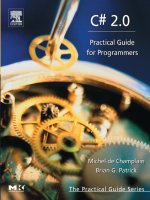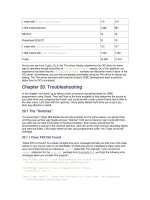Practical mod_perl-CHAPTER 22:Troubleshooting mod_perl
Bạn đang xem bản rút gọn của tài liệu. Xem và tải ngay bản đầy đủ của tài liệu tại đây (123.98 KB, 10 trang )
This is the Title of the Book, eMatter Edition
Copyright © 2004 O’Reilly & Associates, Inc. All rights reserved.
662
Chapter 22
CHAPTER 22
Troubleshooting mod_perl
When something goes wrong, we expect the software to report the problem. But if
we don’t understand the meaning of the error message, we won’t be able to resolve
it. Therefore in this chapter we will talk about errors specific to mod_perl, as
reported by a mod_perl-enabled Apache server.
Many reports are produced by Perl itself. If you find them unclear, you may want to
use the
use diagnostics
pragma in your development code. With the
diagnostics
pragma, Perl provides an in-depth explanation of each reported warning and error.
Note that you should remove this pragma in your production code, since it adds a
runtime overhead.
Errors that may occur during the build and installation stages are covered in the
respective troubleshooting sections of Chapter 3. This chapter deals with errors that
may occur during the configuration and startup, code parsing and compilation, run-
time, and shutdown and restart phases.
Configuration and Startup
This section covers errors you might encounter when you start the server.
libexec/libperl.so: open failed: No such file or directory
If you get this error when you start the server, it probably means that your version of
Perl was itself compiled with a shared library called libperl.so. mod_perl detects this
and links the Apache executable to the same Perl shared library. This error simply
means that the shared library cannot be found by searching the paths that Apache
knows about.
Make sure you have Perl installed on the machine, and that you have libperl.so in
<perlroot>/<version>/<architecture>/CORE
(for example, /usr/local/lib/perl5/5.6.1/
sun4-solaris/CORE).
,ch22.25617 Page 662 Thursday, November 18, 2004 12:46 PM
This is the Title of the Book, eMatter Edition
Copyright © 2004 O’Reilly & Associates, Inc. All rights reserved.
Configuration and Startup
|
663
If the file is there but you still get the error, you should include the directory in which
the file is located in the environment variable
LD_LIBRARY_PATH
(or the equivalent
variable for your operating system). Under normal circumstances, Apache should
have had the library path configured properly at compile time; if Apache was mis-
configured, adding the path to
LD_LIBRARY_PATH
manually will help Apache find the
shared library.
install_driver(Oracle) failed: Can’t load ‘.../DBD/Oracle/
Oracle.so’ for module DBD::Oracle
Here’s an example of the full error report that you might see:
install_driver(Oracle) failed: Can't load
'/usr/lib/perl5/site_perl/5.6.1/i386-linux/auto/DBD/Oracle/Oracle.so'
for module DBD::Oracle:
libclntsh.so.8.0: cannot open shared object file:
No such file or directory at
/usr/lib/perl5/5.6.1/i386-linux/DynaLoader.pm line 169.
at (eval 27) line 3
Perhaps a required shared
library or dll isn't installed where expected at
/usr/local/apache/perl/tmp.pl line 11
On BSD-style filesystems,
LD_LIBRARY_PATH
is not searched for setuid programs. If
Apache is a setuid executable, you might receive this error. Therefore, the first solu-
tion is to explicitly load the library from the system-wide ldconfig configuration file:
panic# echo $ORACLE_HOME/lib >> /etc/ld.so.conf
panic# ldconfig
Another solution to this problem is to modify the Makefile file (which is created
when you run perl Makefile.PL) as follows:
1. Search for the line
LD_RUN_PATH=
2. Replace it with
LD_RUN_PATH=my_oracle_home/lib
where my_oracle_home is, of course, the home path to your Oracle installation. In
particular, the file libclntsh.so.8.0 should exist in the lib subdirectory.
Then just type make install, and all should go well.
Note that setting
LD_RUN_PATH
has the effect of hardcoding the path to my_oracle_
home/lib in the file Oracle.so, which is generated by
DBD::Oracle
. This is an effi-
ciency mechanism, so that at runtime it doesn’t have to search through
LD_LIBRARY_
PATH
or the default directories used by ld.
For more information, see the ld manpage and the essay on
LD_LIBRARY_PATH
at http://
www.visi.com/~barr/ldpath.html.
,ch22.25617 Page 663 Thursday, November 18, 2004 12:46 PM
This is the Title of the Book, eMatter Edition
Copyright © 2004 O’Reilly & Associates, Inc. All rights reserved.
664
|
Chapter 22: Troubleshooting mod_perl
Invalid command ‘PerlHandler’...
Here’s an example of the full error report that you might see:
Syntax error on line 393 of /home/httpd/httpd_perl/conf/httpd.conf:
Invalid command 'PerlHandler', perhaps mis-spelled or
defined by a module not included in the server
configuration [FAILED]
You might get this error when you have a mod_perl-enabled Apache server com-
piled with DSO, but the mod_perl module isn’t loaded. (This generally happens
when it’s an installed RPM or other binary package.) In this case you have to tell
Apache to load mod_perl by adding the following line to your httpd.conf file:
AddModule mod_perl.c
You might also get this error when you try to run a non-mod_perl Apache server
using the httpd.conf file from a mod_perl server.
RegistryLoader: Translation of uri [...] to filename failed
Here’s an example of the full error report that you might see:
RegistryLoader: Translation of uri
[/home/httpd/perl/test.pl] to filename failed
[tried: /home/httpd/docs/home/httpd/perl/test.pl]
In this example, this means you are trying to preload a script called /perl/test.pl,
located at /home/httpd/perl/test.pl in the filesystem. This error shows up when
Apache::RegistryLoader
fails to translate the URI into the corresponding filesystem
path. Most failures happen when a user passes a file path (such as /home/httpd/perl/
test.pl) instead of a relative URI (such as /perl/test.pl).
You should either provide both the URI and the filename:
Apache::RegistryLoader->new->handler($uri, $filename);
or supply a callback subroutine that will perform the URI-to-filename conversion.
The callback accepts the URI as an argument and returns a filename. For example, if
your mod_perl scripts reside in /home/httpd/perl-scripts/ but the base URI is /perl/,
you might do the following:
my $rl = Apache::RegistryLoader->new(
trans => \&uri2filename);
$rl->handler("/perl/test.pl");
sub uri2filename{
my $uri = shift;
$uri =~ s:^/perl/:/perl-scripts/:;
return Apache->server_root_relative($uri);
}
Here, we initialize the
Apache::RegistryLoader
object with the
uri2filename()
func-
tion that will perform the URI-to-filename translation. In this function, we just adjust
,ch22.25617 Page 664 Thursday, November 18, 2004 12:46 PM
This is the Title of the Book, eMatter Edition
Copyright © 2004 O’Reilly & Associates, Inc. All rights reserved.
Code Parsing and Compilation
|
665
the URI and return the filename based on the location of the server root. So if the
server root is /home/httpd/, the callback will return /home/httpd/perl-scripts/test.pl—
exactly what we have requested.
For more information please refer to the
Apache::RegistryLoader
manpage.
Code Parsing and Compilation
The following warnings and errors might be reported when the Perl code is com-
piled. This may be during the server startup phase or, if the code hasn’t yet been
compiled, at request time.
Value of $x will not stay shared at - line 5
This warning usually happens when scripts are run under
Apache::Registry
and sim-
ilar handlers, and some function uses a lexically scoped variable that is defined out-
side of that function.
This warning is important and should be considered an error in most cases. The
explanation of the problem and possible solutions are discussed in Chapter 6.
Value of $x may be unavailable at - line 5
Similar to the previous section, the warning may happen under
Apache::Registry
and
similar handlers, and should be considered an error. The cause is discussed in the
perldiag manpage and possible solutions in Chapter 6.
Can’t locate loadable object for module ...
Here’s an example of the full error report that you might see:
Can't locate loadable object for module Apache::Util in @INC...
In this particular example, it means that there is no object built for
Apache::Util
.
You should build mod_perl with one of these arguments:
PERL_UTIL_API=1
,
EVERYTHING=1
, or
DYNAMIC=1
.
For similar errors, see Chapter 3. Locate the missing module and see what build-time
argument enables it.
Can’t locate object method “get_handlers” ...
If you see this error:
Can't locate object method "get_handlers" via package "Apache"
you need to rebuild your mod_perl with stacked handlers; that is, with
PERL_
STACKED_HANDLERS=1
or with
EVERYTHING=1
.
,ch22.25617 Page 665 Thursday, November 18, 2004 12:46 PM
This is the Title of the Book, eMatter Edition
Copyright © 2004 O’Reilly & Associates, Inc. All rights reserved.
666
|
Chapter 22: Troubleshooting mod_perl
Missing right bracket at line ...
This error usually means you really do have a syntax error. However, you might also
see it because a script running under
Apache::Registry
is using either the
__DATA__
or
__END__
tokens. In Chapter 6, we explain why this problem arises when a script is
run under
Apache::Registry
.
Can’t load ‘.../auto/DBI/DBI.so’ for module DBI
If you have the
DBI
module installed, this error is usually caused by binary incompati-
bilities. Check that all your modules were compiled with the same Perl version that
mod_perl was built with. For example, Perl 5.005 and 5.004 are not binary compati-
ble by default.
Other known causes of this problem are:
• OS distributions that ship with a broken binary Perl installation.
• The
perl
program and
libperl.a
library are somehow built with different binary
compatibility flags.
The solution to these problems is to rebuild Perl and any extension modules from a
fresh source tree. Read Perl’s INSTALL document for more details.
On the Solaris OS, if you see the “Can’t load DBI” or a similar error for the
IO
mod-
ule (or whatever dynamic module mod_perl tries to pull in first), you need to recon-
figure, rebuild, and reinstall Perl and any dynamic modules. When Configure asks for
“additional LD flags,” add the following flags:
-Xlinker --export-dynamic
or:
-Xlinker -E
This problem is known to be caused only by installing GNU ld under Solaris.
Runtime
Once you have your server up and running and most of the code working correctly,
you may still encounter errors generated by your code at runtime. Some possible
errors are discussed in this section.
foo ... at /dev/null line 0
Under mod_perl, you may receive a warning or an error in the error_log file that
specifies /dev/null as the source file and line 0 as the line number where the printing
of the message was triggered. This is quite normal if the code is executed from within
,ch22.25617 Page 666 Thursday, November 18, 2004 12:46 PM









